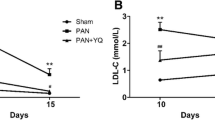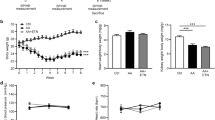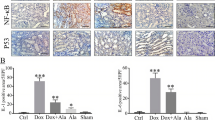Abstract
Tumor necrosis factor-α (TNF-α) is a mediator of inflammation in human and animal renal disease. Pentoxiphylline (PTX) is an inhibitor of TNF-α. In this study we examined the effects of PTX on TNF-α, proteinuria, nitrite production, and apoptosis in an experimental model of Adriamycin (ADR) nephropathy in rats. Rats were divided into four groups: untreated Wistar rats (controls), PTX treatment alone, ADR treatment alone to induce nephropathy, and ADR treatment followed by PTX. ADR treatment followed by PTX treatment prevented the increase in serum TNF-α levels and proteinuria in rats with ADR-nephropathy (P<0.05). Urine nitrite levels were significantly increased in the ADR-induced nephropathy group and the increase was prevented in the ADR-induced nephropathy group when they also received PTX. The urine nitrite levels were not different between the PTX-treated group and the untreated control rats. PTX prevented the rise of serum TNF-α in ADR nephropathy rats and a decrease in proteinuria, urine nitrite, and apoptosis in the renal tissue. These findings suggest a beneficial anti-inflammatory effect of PTX.
Similar content being viewed by others
References
Ozen S, Usta Y, Sahin-Erdemli I, Orhan D, Gumusel B, Yang B, Gursoy Y, Tulunay O, Dalkara T, Bakkaloglu A, El-Nahas M (2001) Association of nitric oxide production and apoptosis in a model of experimental nephropathy. Nephrol Dial Transplant 16:32–38
Gomez-Chiarri M, Ortiz A, Lerma JL, Lopez-Armada MJ, Mampaso F, Gonzalez E, Egido J (1994) Involvement of tumor necrosis factor and platelet activating factor in the pathogenesis of experimental nephrosis in rats. Lab Invest 70:449–459
Ozen S, Saatci U, Tinaztepe K, Bakkaloglu A, Barut A (1994) Urinary tumor necrosis factor levels in primary glomerulopathies. Nephron 66:291–294
Zabel P, Schade FU, Schlaa M (1993) Inhibition of endogenous TNF formation by pentoxyfylline. Immunobiology 187:447–463
Belloc F, Jaloustre C, Dumain P, Lacombe F, Lenoble M, Boisseau MR (1995) Effect of pentoxyfylline on apoptosis of cultured cells. Cardiovasc Pharmacol [Suppl] 2:S71–S74
Lauterbach R, Grabowska A, Marcinkiewicz J (1995) Effect of pentoxifylline on nitric oxide released by murine macrophages. Biol Neonate 67:72–76
Chien-Chen Tsai, Ming-Shiou Wu, Tun-Jun Tsai (1999) Pentoxifylline attenuates experimental mesangial proliferative glomerulonephritis. Kidney Int 56:932–943
Ducloux D, Bresson-Vautrin C, Chalopin J (2001) Use of pentoxifylline in membranous nephropathy. Lancet 357:1672–1673
Baud L, Ardaillou R (1995) Tumor necrosis factor in renal injury. Miner Electrolyte Metab 21:336–341
Poljakovic M, Nygren JM, Persson K (2003) Signalling pathways regulating inducible nitric oxide synthase expression in human kidney epithelial cells. Eur J Pharmacol 23:21–28
Amore A, Coppo R (2000) Role of apoptosis in pathogenesis and progression of renal diseases. Nephron 86:99–104
Meldrum KK, Burnett AL, Meng X, Misseri R, Shaw MB, Gearhart JP, Meldrum DR (2003) Liposomal delivery of heat shock protein 72 into renal tubular cells blocks nuclear factor-kappaB activation, tumor necrosis factor-alpha production, and subsequent ischemia-induced apoptosis. Circ Res 92:293–299
Meldrum KK, Meldrum DR, Hile KL, Yerkes EB, Ayala A, Cain MP, Rink RC, Casale AJ, Kaefer MA (2001) P38 MAPK mediates renal tubular cell TNF-alpha production and TNF-alpha-dependent apoptosis during simulated ischemia. Am J Cell Physiol 281:C563–C570
Kim YK, Choi TR, Kwon CH, Kim JH, Woo JS, Jung JS (2003) Beneficial effect of pentoxifylline on cisplatin-induced acute renal failure rabbits. Ren Fail 25:909–922
Chen YM, Ng YY, Lin SL, Chiang WC, Lan HY, Tsai TJ (2004) Pentoxifylline suppresses renal tumour necrosis factor-alpha and ameliorates experimental crescentic glomerulonephritis in rats. Nephrol Dial Transplant (available online)
Lin SL, Chen YM, Chien CT, Chiang WC, Tsai CC, Tsai TJ (2002) Pentoxifylline attenuated the renal disease progression in rats with remnant kidney. J Am Soc Nephrol 13:2916–2929
Galindo-Rodriguez G, Bustamante R, Esquivel-Nava G, Salazar-Exaire D, Vela-Ojeda J, Vadillo-Buenfil M, Avina-Zubieta JA (2003) Pentoxifyllin in the treatment of refractory nephrotic syndrome secondary to lupus nephritis. J Rheumatol 30:2382–2384
Author information
Authors and Affiliations
Corresponding author
Rights and permissions
About this article
Cite this article
Usta, Y., Ismailoglu, U.B., Bakkaloglu, A. et al. Effects of pentoxifylline in Adriamycin-induced renal disease in rats. Pediatr Nephrol 19, 840–843 (2004). https://doi.org/10.1007/s00467-004-1538-5
Received:
Revised:
Accepted:
Published:
Issue Date:
DOI: https://doi.org/10.1007/s00467-004-1538-5




